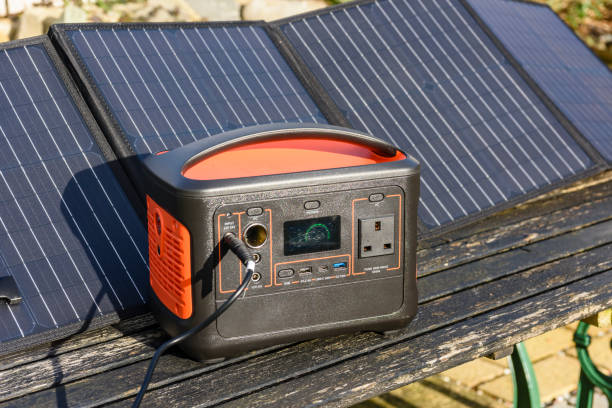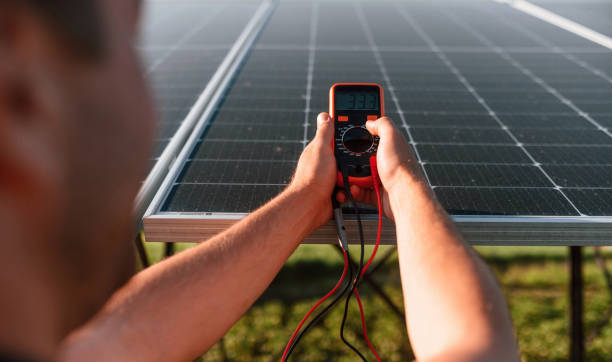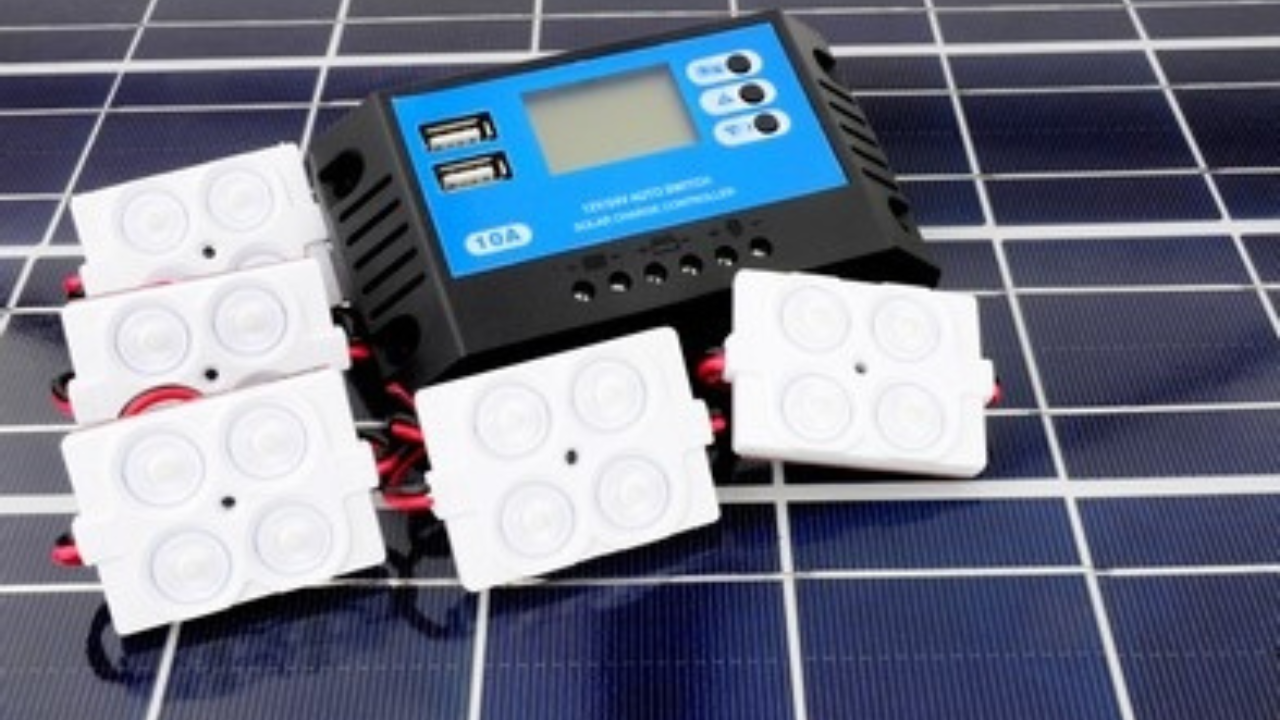Yes, you can use a PWM solar controller for lithium batteries. When using a PWM solar controller for lithium batteries, it is important to ensure the controller is compatible with lithium chemistry.
Please verify that the controller has a specific charging profile for lithium batteries, as they require a different charging algorithm than lead-acid batteries. Some PWM controllers may not be optimized for lithium batteries and could damage them.
Therefore, choosing a PWM solar controller specifically designed for use with lithium batteries is essential to ensure efficient and safe charging.
Understanding the compatibility and requirements is crucial for maximizing the performance and longevity of the lithium batteries in a solar power system.
Why Lithium Batteries?
Lithium batteries have become increasingly popular as a reliable and efficient power storage solution in the world of renewable energy. This cutting-edge technology is revolutionizing how we harness solar energy, offering numerous benefits compared to traditional lead-acid batteries.
Let’s delve into the ‘Why Lithium Batteries?’ and explore the advantages and growing popularity of these advanced energy storage systems.
Advantages Of Lithium Batteries
Lithium batteries have several key advantages that make them a preferred choice for solar energy storage:
- Higher Energy Density: Lithium batteries offer a higher energy density, allowing for more energy storage in a smaller, lighter package.
- Longer Lifespan: Compared to lead-acid batteries, lithium batteries typically have a longer lifespan, reducing the frequency of replacements.
- Faster Charging: Lithium batteries can be charged faster, optimizing the utilization of solar power.
- Depth of Discharge: They can be discharged to a greater extent without causing damage, maximizing the usable capacity.
- Lower Maintenance: Lithium batteries require minimal maintenance, saving time and effort in the long run.
Growing Popularity Of Lithium Batteries
The growing popularity of lithium batteries in solar applications can be attributed to their exceptional performance and reliability.
As the demand for sustainable energy solutions continues to rise, more and more solar enthusiasts and professionals recognize the numerous benefits lithium batteries offer, driving their widespread adoption across the industry.

Understanding Pwm Solar Controllers
What Is A Pwm Solar Controller?
A PWM (Pulse Width Modulation) solar controller is a device used to regulate the charge from a solar panel to a battery. It acts as an intermediary between the solar panels and the battery, ensuring it receives the optimal charge.
How Does A Pwm Solar Controller Work?
A PWM solar controller regulates energy flow from the solar panels to the battery. It uses PWM signals to control the charging process, ensuring the battery is charged efficiently and safely.
The controller constantly monitors the battery voltage and adjusts the charging rate to prevent overcharging, ultimately extending the battery’s lifespan.
Compatibility With Lithium Batteries
A PWM solar controller is incompatible with lithium batteries due to differences in voltage and charging methods. It is essential to use an MPPT solar controller specifically designed for lithium battery systems to ensure optimal performance and longevity.
Can A Pwm Solar Controller Be Used With Lithium Batteries?
One common question among solar power enthusiasts is whether a PWM (Pulse Width Modulation) solar controller can be used with lithium batteries. The short answer is yes, you can use a PWM solar controller with lithium batteries, but there are a few things you need to consider.
Potential Issues With Using Pwm Solar Controllers For Lithium Batteries
While it is possible to use a PWM solar controller with lithium batteries, there are some potential issues that you should be aware of. Lithium batteries have different characteristics compared to traditional lead-acid batteries, which can affect the performance and lifespan of your batteries when using a PWM solar controller.
One of the main issues is that a PWM solar controller does not have a built-in low voltage disconnect (LVD) feature, which is crucial for protecting lithium batteries. LVD prevents the batteries from being over-discharged, which can cause permanent damage and reduce their overall lifespan.
Pros And Cons Of Using A Pwm Solar Controller With Lithium Batteries
Let’s take a look at some of the pros and cons of using a PWM solar controller with lithium batteries:
| Pros | Cons |
|---|---|
| 1. Affordable and widely available | 1. Lack of built-in LVD increases the risk of over-discharging the batteries |
| 2. Simple and easy to use | 2. May not be as efficient as MPPT (Maximum Power Point Tracking) controllers |
| 3. Suitable for small-scale solar power systems | 3. Limited control over battery charging process |
These considerations can help you determine whether a PWM solar controller is the best for your lithium battery-powered solar system. Alternatively, you may explore MPPT solar controllers, which offer better efficiency and advanced features specifically designed for lithium batteries.
In conclusion, while a PWM solar controller can be used with lithium batteries, it is essential to understand the limitations and potential issues associated with this setup.
You can decide on your solar power system by considering the pros and cons and weighing them against your specific needs and budget.

Credit: au.renogy.com
Advantages Of Using Pwm Solar Controllers With Lithium Batteries
PWM solar controllers offer several advantages when used with lithium batteries. They enable efficient charging and prolong battery lifespan while preventing overcharging and damage. This combination ensures optimal performance and longevity in solar power systems.
Choosing a suitable controller for your batteries is essential when powering your solar system. PWM (Pulse Width Modulation) solar controllers offer several advantages when paired with lithium batteries.
These controllers help regulate the charge from your solar panels to the batteries, maximizing efficiency and improving battery life.
Increased Efficiency
PWM solar controllers provide increased efficiency when charging lithium batteries. They work by pulse width modulation, which means they maintain a constant voltage and adjust the width of the pulses to regulate the charge. This technique allows for a more efficient energy transfer from the solar panels to the batteries.
Improved Battery Life
A PWM solar controller with lithium batteries can significantly extend the battery life. These controllers have advanced charge algorithms that protect the batteries from overcharging or undercharging, preventing unnecessary wear and tear.
With the precise regulation provided by PWM controllers, your lithium batteries can operate at their optimal voltage, leading to a longer lifespan and reliable performance.
In addition, PWM controllers help prevent voltage fluctuations, which can occur with other controllers. These fluctuations can damage lithium batteries, reducing their capacity over time. By maintaining a stable voltage through pulse width modulation, PWM controllers safeguard your batteries and ensure long-lasting performance.
Considerations For Using Pwm Solar Controllers With Lithium Batteries
Welcome to our blog post, discussing the considerations for using PWM solar controllers with lithium batteries. Suppose you’re considering using a PWM solar controller with your lithium battery system.
In that case, it’s essential to understand the voltage compatibility, temperature compensation, and charge control parameters to ensure optimal performance and longevity of your batteries.
Voltage Compatibility
When using a PWM solar controller with lithium batteries, it’s crucial to ensure that voltage compatibility suits your battery system. Lithium batteries typically have different voltage requirements compared to traditional lead-acid batteries.
Therefore, selecting a PWM solar controller with the appropriate voltage range to match your lithium batteries is essential.
Be sure to consult the specifications of your solar controller and lithium battery system to determine if the voltage compatibility aligns. Using a PWM solar controller with the wrong voltage range could damage your lithium batteries or lead to inefficient charging.
Temperature Compensation
Temperature compensation is another important consideration when using a PWM solar controller with lithium batteries. Lithium batteries are sensitive to temperature variations, and their charging and discharging characteristics can be affected by temperature.
Ensure that your PWM solar controller has temperature compensation capability, which allows it to adjust the charging parameters based on the ambient temperature. This feature ensures that your lithium batteries are charged effectively and protected from temperature-related issues such as overcharging or undercharging.
Charge Control Parameters
Charge control parameters refer to the settings or parameters that determine the charging behavior of your PWM solar controller. When using a PWM solar controller with lithium batteries, it is essential to correctly understand and set the charge control parameters for optimal performance.
Consult the manufacturer’s guidelines or the documentation provided with your PWM solar controller to understand the charge control parameters specific to lithium batteries. These parameters may include absorption, float, and charging current limits.
Using the wrong charge control parameters for your lithium battery system can lead to inadequate charging or overcharging, which can impact the performance and lifespan of your batteries. It is crucial to configure these parameters accurately to ensure efficient and safe charging.
Now that you understand the considerations for using PWM solar controllers with lithium batteries, you can confidently choose the suitable controller for your system and optimize the performance of your battery system. Always consult the manufacturer’s specifications and guidelines to ensure compatibility and reliability.

Can PWM charge LiFePO4?
Yes, LiFePO4 (Lithium Iron Phosphate) batteries can be charged using Pulse Width Modulation (PWM) techniques, although it’s not the most common method for charging them. LiFePO4 batteries typically require a more precise charging profile to ensure longevity and safety.
PWM charging involves rapidly switching the charging current on and off, effectively controlling the average current delivered to the battery. While PWM can work for some battery chemistries, it may not be optimal for LiFePO4 batteries due to their sensitivity to overcharging and the need for precise voltage and current control during charging.
For LiFePO4 batteries, a dedicated LiFePO4 charger with a proper charging algorithm is recommended to ensure the battery is charged safely and efficiently. These chargers typically employ constant current (CC) and constant voltage (CV) charging stages, followed by a taper charging phase to ensure the battery is fully charged without overcharging it.
Using a charger specifically designed for LiFePO4 batteries will help maximize their lifespan and performance while ensuring safety during charging.
PWM charge controller
PWM (Pulse Width Modulation) charge controllers can charge LiFePO4 batteries. Still, it’s essential to ensure that the charge controller is specifically designed to support the charging requirements of LiFePO4 batteries.
PWM charge controllers regulate the charging current provided to the battery by rapidly switching the connection between the solar panel and the battery. This switching creates a pulse-like charging current, where the width of the pulses is modulated to control the average current flowing into the battery.
However, charging lithium iron phosphate (LiFePO4) batteries requires careful voltage and current control throughout the charging process to ensure safety and maximize battery lifespan.
While PWM charge controllers can provide a relatively simple and cost-effective charging solution, they may not offer the same precision and sophistication as MPPT (Maximum Power Point Tracking) charge controllers or dedicated LiFePO4 battery chargers.
When using a PWM charge controller with LiFePO4 batteries, selecting a controller with the appropriate charging algorithm for this battery chemistry is crucial. This algorithm should include temperature compensation, voltage regulation, and current limiting to ensure optimal charging performance and battery longevity.
In summary, while PWM charge controllers can be used for charging LiFePO4 batteries, choosing a controller specifically designed or configured for this purpose is essential to ensure safe and efficient charging.
Best solar controller for AGM batteries
When selecting a solar charge controller for AGM (Absorbent Glass Mat) batteries, you’ll want to ensure it has features that are compatible with the charging requirements of AGM batteries.
AGM batteries typically require a multi-stage charging profile to ensure optimal performance and longevity. Here are some features to look for in a solar charge controller for AGM batteries:
- Multi-stage charging: AGM batteries benefit from a charging profile including bulk, absorption, and float charging stages. Look for a controller that supports these stages to ensure the battery is charged efficiently and safely.
- Temperature compensation: AGM batteries are sensitive to temperature variations, so a charge controller with temperature compensation capability will adjust the charging voltage based on the battery temperature, helping to prevent overcharging or undercharging.
- Low-voltage disconnect (LVD): Some charge controllers offer LVD functionality, disconnecting the load from the battery if the voltage drops below a certain threshold. This feature can help prevent over-discharging of the battery, which can damage AGM batteries.
- Load control: If loads are connected directly to the battery, look for a charge controller with load control capability. This feature allows you to set different operating modes for the load, such as on/off control or time-based control.
- Maximum Power Point Tracking (MPPT): While not specific to AGM batteries, MPPT charge controllers are generally more efficient than PWM controllers at harvesting power from solar panels. If you have larger solar arrays or want to maximize energy harvest, consider an MPPT controller.
- Quality and reliability: Choose a reputable brand with a record of producing reliable charge controllers. Look for controllers with appropriate certifications and good reviews from other users.
Some popular solar charge controller brands known for their quality and reliability include Morningstar, Victron Energy, OutBack Power, and Renogy. Choose a controller with the appropriate capacity (in terms of maximum solar input current and battery voltage) for your specific application.
Frequently Asked Questions For Can I Use A Pwm Solar Controller For Lithium Batteries
Can A Pwm Solar Controller Be Used With Lithium Batteries?
Yes, a PWM solar controller can be used with lithium batteries. However, it is essential to note that lithium batteries require a specific charging algorithm to ensure their optimal performance and longevity. While PWM controllers can work with lithium batteries, it is recommended to use MPPT controllers for better efficiency and battery life.
What Is The Difference Between Pwm And Mppt Solar Controllers For Lithium Batteries?
The main difference between PWM and MPPT solar controllers is their charging mechanism. PWM controllers adjust the voltage output of the solar panel to match the battery voltage, while MPPT controllers maximize the solar panel’s power output and convert it to the optimal voltage for charging the lithium battery.
MPPT controllers offer higher efficiency and faster charging compared to PWM controllers.
Is It Safe to Use a Pwm Solar Controller To Charge Lithium Batteries?
Yes, using a PWM solar controller to charge lithium batteries is safe. However, ensuring that the controller is compatible with lithium batteries and has the necessary charging algorithm is essential to prevent overcharging or damaging the batteries.
An MPPT controller for lithium batteries is recommended for better performance and safety.
Do you need a special solar controller for lithium batteries?
Yes, you typically need a solar charge controller specifically designed for lithium batteries to ensure proper charging and battery protection.
Can I charge lifepo4 with PWM?
You can charge lithium iron phosphate (LiFePO4) batteries using a Pulse Width Modulation (PWM) solar charge controller. However, a charge controller designed explicitly for LiFePO4 batteries is recommended to ensure optimal charging performance and battery longevity.
What is the difference between MPPT and PWM for lithium?
MPPT is more efficient and better suited for lithium batteries, while PWM is more straightforward and less efficient.
What batteries does PWM solar controller use?
PWM solar controllers can be used with various types of batteries, including lead-acid (flooded, gel, AGM) and some lithium-ion chemistries like lithium iron phosphate (LiFePO4).
Can I use MPPT for lithium battery?
Yes, you can use MPPT (Maximum Power Point Tracking) charge controllers for lithium batteries.
Conclusion
Using a PWM solar controller for lithium batteries can have its limitations. While it may work in some cases, it’s essential to consider the specific requirements of your lithium battery system. An MPPT solar controller is generally recommended for better efficiency and performance, as it can optimize the charging process.
Understanding the nuances of these controllers ensures that your solar system operates at its best potential, ensuring a reliable and sustainable energy source.

I am Nishadujjaman.I have two years of experience all types of battery like tesla battery,car battery etc. So I work on solving these issues and give various tips on these issues.
